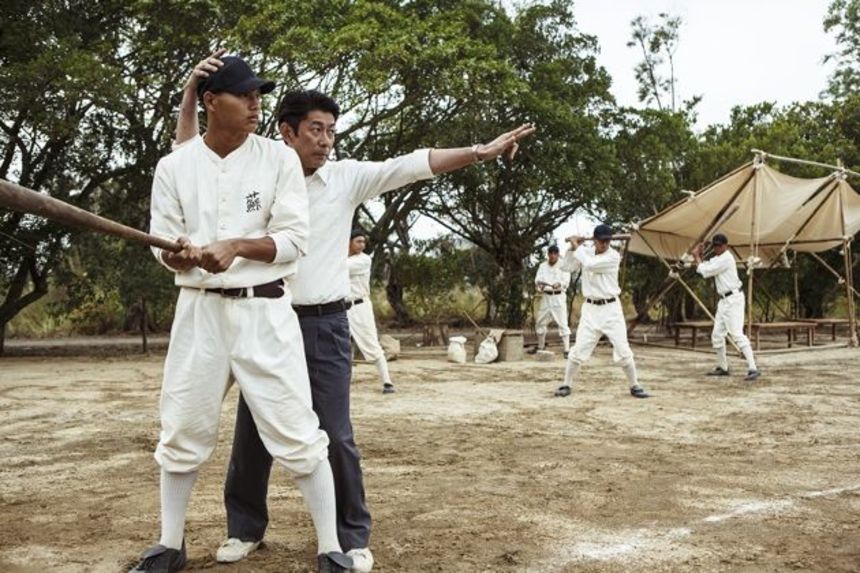Review: Baseball Epic KANO Hits A Home Run

From the team behind Taiwanese epic Seediq Bale comes a rousing big screen sports saga telling the incredible true story of the Kano baseball team, a multiethnic squad of rural highschoolers who made it to the national championships in Japan in 1931.
In this day and age it can be difficult to make a genuinely good sports film. Either the nature of the game itself alienates large portions of the potential audience if they are not interested or do not understand it, or the contests themselves tend to have a fairly predictable outcome. That said, when done right, a successful sports film can make audiences cling to the edge of their seats in anticipation, cheer out loud in the euphoria of victory, and even shed a little tear along the way, for any number of reasons.
Hot off the one-two punch of Cape No.7 and Seediq Bale, Taiwanese director Wei Te-sheng opts to write and produce this grand scale, 3-hour true story, while gifting Seediq Bale star Umin Boya his first start in the director's chair. And it's fair to say that he hits Kano out of the park, aided in no small part by a stellar cast of youngsters filling out most of the leading roles.
In 1931, when Taiwan was under Japanese rule (following the conflict depicted in Wei's previous film), an underdog team like no other won the hearts of the entire Japanese empire, when they emerged seemingly from nowhere to take the Koshien High School Championships by storm. Prior to that season, this rag tag collection of farmers' kids and village lads had never even managed to score a single run, let alone win a game. What made the team unique, however, was that it was made up of Japanese, Han Chinese and indigenous Taiwanese boys - something not only unheard of, but actively campaigned against prior to their participation.
The secret to Kano's overnight success was the commanding leadership of Coach Kondo. Brilliantly portrayed with commanding stoicism by Nagase Masatoshi, Kondo is a former player who finds himself in the small southern town of Kagi, together with his wife and two young daughters. Compelled to bring some order and discipline to these boys, Kondo takes over the team officially, where he must deal with a lack of budget but reams of bureaucracy from the school board and town authorities, none of whom see any promise in the team.
While Kondo leads them with a stern hand, the boys are quick to recognise the benefits of regimented training and the nurturing of a strong team dynamic. What is most interesting is how the ethnic differences between the teammates themselves never fazes them in the slightest, and is only ever brought up by outsiders - mainly authority figures and the mainland Japanese press. The boys just want to play, and improve, and go all the way to Koshien - a dream Kondo instills in them as much for his own emotional catharsis as for them.
There are subplots in the story, and larger themes that flirt with the audience's attention along the way. The development of the Kanan Canal through the region, which will transform the town into a rich agricultural haven is an obvious but underplayed metaphor for how the responsibility and discipline Kondo instills in the boys will help not only the team, but the country as a whole. Of course, the shadow of the Pacific War looms ominously in the background. The film is told in a series of extended flashbacks from the perspective of Aoki Ken's rival ball player, who finds himself in Kagi many years later. The notion that many, if not all, of the Kano boys will have been touched and consumed by the conflict lingers throughout.
The individual members of the team aren't given much opportunity to develop when off the diamond, with the possible exception of star pitcher Akira Go (Tsao Yu-ning), one of the indigenous players, who has the closest thing to a romance, albeit one he is never able to consummate. In that regard, Wei and Boya maintain the notion that the team is a single unit, and whether they are playing, training, or getting into scraps with rival squads, they do so together, rather than as identifiable individuals.
Kano's 3-hour running time is an obvious point of contention, but Boya keeps the pace brisk, when not unbearably tense, and the mood light, except when the emotions of the sport itself take over. The choreography of the games themselves is almost balletic, brilliantly conveyed in the film's final third as the deft fielding of this unknown side slowly begins to win over the cynical 50,000-strong crowd at Koshien stadium. Sato Naoki's score does lean towards the bombastic, even militaristic, and ensures there is never a missed emotional beat or breath of subtlety to the whole affair. But Chin Ting-chang's sumptuous photography conveys that there is no room for subtlety in this grand spectacle, capturing the paddy fields back home and the roaring crowds in Koshien in sumptuous colours and breathtaking vistas from his swooping cameras.
Kano is big, brazen and unashamedly sentimental in its depiction of this incredible story of determination, self-belief and hard work - values nobody should complain about being peddled to younger audiences as seductively as this. The young cast are charismatic, enthusiastic and quite often shirtless, which won't hurt ticket sales either. The result is a rollicking epic of entertainment that will force you to stifle the occasional cheer and even shed a few tears, and most importantly, doesn't require you to have any understanding or affection for the sport of baseball. The real thing often loses my attention before the end of the first innings, but Kano is riveting from beginning to end.

Do you feel this content is inappropriate or infringes upon your rights? Click here to report it, or see our DMCA policy.






